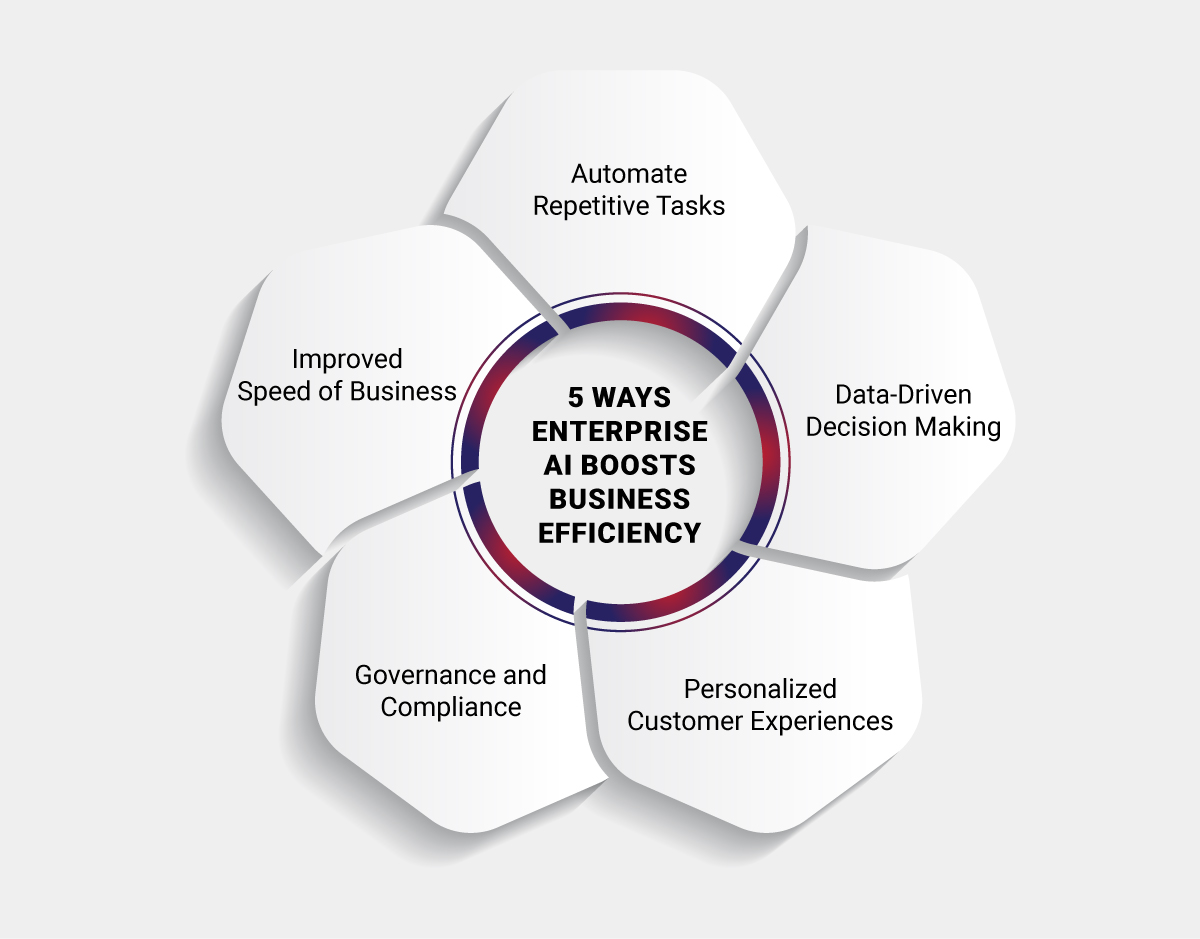Artificial Intelligence in enterprise solutions stands out from traditional software systems because of the exponential speed at which one can do things. In today’s hyper-connected world, where speed of processing and speed to market are critically important factors, enterprise AI has the potential to accelerate digital transformation.
The computational capabilities of AI and ML allow more and more enterprises to leverage emerging AI technologies to improve the bottom line of their business. According to a new global study of C-suite executives, chief architects, and data scientists by MIT Technology Review, 81%[1] of respondents expect AI to boost efficiency in their industry by at least 25% in the next two years.
So, let us explore this informative piece of content to understand how incorporating AI into your business operations can help you derive maximum business value.
What is Enterprise AI?
Enterprise AI is a subset of Artificial Intelligence (AI) that gives machines the human capacity to learn but at a much faster rate than humans. Enterprise AI applies this ability to an organization’s data strategy to solve complex problems by harnessing the advanced capabilities of AI to drive digital transformation. Deloitte’s ‘State of AI in Enterprise’ report reveals that 94%[2] of the 2620 business leaders see enterprise AI applications as critical to their success now and in the coming years.
Leverage Artificial Intelligence in Enterprise to Drive Business Growth and Improve Operational Efficiency
AI adoption in the enterprise helps businesses accelerate growth by identifying newer market opportunities and segments to serve end customers in a more meaningful way. Since data transcends industry boundaries, it holds tremendous potential and opportunity to build data and AI-driven products and services. It also helps unlock efficiencies at scale and, more importantly, build connected ecosystems.
Going beyond generative AI, enterprise AI leverages ML algorithms, NLP, and Large Language Models (LLM) to extract insights, automate tasks, and optimize operational efficiency, which enables businesses to uncover hidden patterns in data, make accurate predictions, increase operational efficiency, and derive valuable insights from data.
Business Benefits of Artificial Intelligence for Enterprise
According to research firm Frost & Sullivan’s Global State of AI 2022 report, 87%[3] of organizations believe AI and machine learning will help them grow, boost operational efficiency, and improve customer experiences. Businesses that correctly leverage the enterprise AI opportunity can automate labor-intensive processes, anticipate supply chain issues, and create personalized experiences for every customer. Here are some of the key benefits of AI to help you understand how leveraging artificial intelligence in enterprise will assist you in improving your business efficiency.

Automate Repetitive Tasks
By automating routine, repetitive tasks, such as customer service inquiries, order processing, and report generation, among others, enterprise AI helps companies increase efficiency accuracy and enhance productivity. Moreover, since AI algorithms can process large volumes of data at high speeds, they significantly reduce the time required for repetitive tasks to help businesses become more agile and responsive to market changes.
Data-Driven Decision Making
Custom enterprise AI solutions quickly and accurately analyze large amounts of data in real time to identify meaningful patterns and insights that can enhance decision-making across various facets of operations. It also helps businesses simulate different scenarios and make more informed decisions for future strategies. Yet another significant benefit of enterprise AI is their ability to help businesses make more objective decisions by removing human bias from the decision-making process. The adoption of AI in enterprises leads to improved competitiveness and sustainable growth.
Personalized Customer Experiences
Custom AI solutions for enterprise enable businesses to analyze customer data in real-time to understand present preferences, behaviors, and buying patterns and anticipate future needs and preferences. This helps deliver tailored experiences and personalized recommendations for products and services to their customers. It reduces the latency between the time it takes to address customer queries and concerns, literally solving it in real time. Since enterprise AI solutions can predict customer behavior based on historical data and ML algorithms, they also help businesses create targeted marketing campaigns and send timely and relevant marketing messages.
Governance and Compliance
AI enterprise solutions automate compliance monitoring and reporting to help organizations identify and predict potential risks without manual effort. Further, AL algorithms can be trained to automate the response to compliance incidents, enabling faster and more efficient risk assessment and incident management. One of the other benefits of using AI in business is reducing the costs of (Enterprise Governance, Risks, and Compliance) EGRC achieved through automating tasks and workflows to improve the efficiency of risk assessment, compliance monitoring, and incident management. Enterprise AI thus helps companies gain better visibility and insights into their risks and compliance status and become more agile and resilient.
Improved Speed of Business
AI automates a wide range of internal and customer-facing labor-intensive tasks and processes while helping businesses make decisions more quickly. Furthermore, AI-driven predictive analytics provide companies with insights into customer preferences, market trends, or even machine failures, allowing companies to respond to future events proactively. Thus, by automating workflows and improving decision-making, enterprise AI enables shorter business cycles to accelerate product development and reduce the time to market new products and services.
Implementing Enterprise AI: A Step-by-Step Approach
Scroll down to learn about sure-shot 05 steps to implement AI in your business to unlock its full potential.
Step#1 Identify Areas of Opportunity and Set Goals
It starts with identifying pain points and challenges your business faces where implementing AI can bring significant value to your enterprise. This could involve streamlining internal processes, improving customer interactions, or optimizing supply chain management. Focus on areas where time can be saved or repetitive tasks automated. Next, outline clear goals for AI integration, whether enhancing operational efficiency, elevating customer experience, or refining risk management.
Step# 2. Pilot The First Enterprise AI Adoption
Start small with a pilot project to test the effectiveness and feasibility of the chosen AI solutions and then scale gradually. Starting small allows you to learn, adjust, and scale up as you gain experience and confidence. Ensure you have the resources and leadership support to implement and successfully drive the pilot AI project. Define the scope of the pilot with regards to the specific tasks the AI solution will perform, the data it will need, and success KPIs. Assemble a team with the necessary skills and expertise or collaborate with an experienced AI services and solutions provider for a more effective integration process.
Step# 3 Data Collection and Preparation
AI algorithms need to be trained on large and representative dataset, so it is crucial to ensure the information is accurate, comprehensive, and representative of your business operations. AI algorithms are trained on data, so you will need to Establish a robust data collection and storage infrastructure. Clean, organize, and prepare your data meticulously to ensure its relevance and quality for the AI algorithms. This data should be high-quality and relevant to the AI algorithms.
Step #4 Implement and Test
This step involves training your employees to use the new AI tools and integrate the AI solutions into your existing business processes. Proper training equips your team to harness the full potential of AI tools, maximizing their efficiency and effectiveness.
Step#5 Continuous Monitoring and Adjustment
Successful implementation of AI requires continuous, iterative development and learning. Continuously monitor its performance and be prepared to make necessary adjustments. Regular assessments help refine the AI systems, ensuring they align with your business goals.
By following the above steps, you can effectively leverage artificial intelligence in enterprise and enhance your productivity by automating repetitive tasks, and gaining a competitive edge.
Enterprise AI Use Cases
AI is revolutionizing industries across the board, helping businesses streamline operations, improve decision-making, and deliver better customer experiences. Let’s explore common use cases in FinTech, Ad Tech, and Healthtech on how AI is helping businesses in these industries operate more effectively and deliver better customer outcomes.
Enterprise AI Use Cases in FinTech
AI is driving three overarching trends in the FinTech industry – digitization, automation, and prediction. Traditionally, investment bankers and advisors have been using information to develop an investment strategy on behalf of a client. AI and predictive modeling enable fintech companies to process customer data faster and maximize product personalization. Let’s explore some popular use cases of enterprise AI in fintech:
- Fraud Detection: Machine Learning algorithms analyze large amounts of data to detect and flag any anomalies. For example, PayPal[4] uses an AI-powered fraud detection system to detect fraudulent transactions in real-time and analyzes billions of transactions daily to identify and flag suspicious activity.
- Automated Risk Assessment: Fintech companies employ AI-driven automated risk assessment to ensure compliance with stringent regulations, monitoring transactions in real-time for any signs of suspicious activity, such as money laundering. Beyond speed, AI enterprise solutions play a significant role in credit evaluation, fraud detection, operational risk management, and ensuring regulatory compliance. These AI-driven credit scoring and risk assessment models help fintech companies make better lending decisions, reduce the risk of losses, and bolster their overall financial resilience.
- Algorithmic Trading: Through advanced data analysis and pattern recognition, AI processes vast market data, identifying valuable trading opportunities and potential risks. It aids in risk management by developing sophisticated strategies like stop-loss orders. Additionally, AI ensures swift and efficient order execution, adapting algorithms to changing market conditions in real-time. Moreover, AI protects against fraud, detects suspicious trading patterns, and prevents fraudulent activities. Fintech companies leverage AI to deploy tailored trading strategies for retail traders, enhance their own trading operations, and provide robust fraud detection solutions.
Enterprise AI Use Cases in Ad Tech
Artificial intelligence-powered automation is revolutionizing the ad-tech space, including the Retail Media Networks (RMNs), by streamlining ad bidding and ad-buying processes. According to a report by Google, AI-driven ad campaigns have seen an average conversion rate of 30%[5], highlighting the effectiveness of personalized ads. Here are three common use cases of AI in Ad Tech.
- Programmatic Advertising: AI solutions help automate and optimize programmatic advertising campaigns. Artificial Intelligence enables marketers to analyze vast amounts of data in real-time and make predictions based on it, thus improving accuracy and personalizing ad experiences for users. AI-powered programmatic advertising platforms also automate the bidding strategies for ad space so that advertisers get the best possible price for their ads. AI for enterprise applications in programmatic advertising analyzes factors such as the user’s current location, device type, and browsing history to optimize ad delivery by serving personalized ads to users at the right time and in the right place. This can help advertisers create, target, deliver, and reach their target audiences more effectively and achieve better campaign results.
- AI-Driven Audience Targeting: AI-driven tools and technologies help advertising professionals develop more sophisticated audience-targeting solutions. AI analyzes diverse data points such as demographics, interests, and behavior, allowing advertisers to identify potential customers for each advertiser. Armed with this knowledge, they accurately target specific segments with remarkable accuracy. This helps yield high returns on investment and gain a competitive edge. According to Reuters[6], Large advertising agencies and companies like WPP, Unilever, and Nestle use AI to cut costs and increase productivity.
- Fraud Detection: Advanced AI algorithms analyze vast volumes of data, detecting suspicious patterns such as multiple ad clicks from the same IP address or interactions from bots. By promptly identifying and preventing ad fraud, businesses safeguard their advertising budgets and ensure their marketing efforts reach genuine human audiences. This level of security protects financial resources and maintains the integrity of ad campaigns, ensuring that the advertised products or services are showcased to real potential customers.
Enterprise AI Use Cases in Health Tech
AI’s is reshaping healthcare by making it more efficient, effective, and accessible. Here are the top three transformative use cases of AI in Health Tech:
- Drug Discovery and Development: AI-driven platforms are revolutionizing the drug discovery process. By analyzing vast biological and clinical datasets, AI identifies new drug targets and develops potential candidates swiftly and efficiently. AI screens millions of compounds through advanced algorithms, designs novel drug molecules, and predicts their safety and efficacy in clinical trials.
- Medical Imaging Analysis: AI-powered medical imaging analysis is redefining diagnostics. With remarkable precision, AI algorithms interpret complex medical images, including X-rays, MRI scans, and CT scans, to help radiologists deliver improved patient care. AI ensures precise and efficient diagnoses, from detecting cancer cells in X-rays to assessing brain injuries in CT scans. This heightened accuracy enables swift identification of diseases and abnormalities, leading to timely and personalized patient care.
- Clinical Decision Support: AI is empowering clinicians with personalized insights for patient care. Through analysis of patient data such as medical history and diagnostic tests, AI-driven clinical decision support systems provide tailored treatment recommendations. These systems aid clinicians in making informed and accurate decisions, ranging from cancer treatments to predicting patient responses to specific therapies. The result is enhanced patient outcomes and improved overall healthcare quality.
Rishabh Software’s Role in Accelerating Enterprise AI Adoption
With a team of highly skilled and experienced AI engineers, we can help you build custom enterprise AI solutions for a connected software ecosystem to meet your specific business needs. Our end-to-end services for enterprise software development ensure to drive digital transformation with deep industry knowledge, best-breed solutions, and contextual customer experiences.
We have successfully developed and implemented ML and Deep Learning algorithms for diverse industries such as Healthcare, Fintech, and FMCG. With over two decades of experience delivering innovation and automation, we have helped all shapes and sizes of businesses with their digital transformation initiatives of any scale.
Our Artificial intelligence consulting services empower enterprises to effectively strategize, plan, and execute AI-driven initiatives.
Takeaway
At a time when organizations have more data than ever before, AI solutions for enterprises will be a crucial part of the toolkit for innovation and growth. Artificial intelligence in enterprise will help your organization to make the smartest business decisions by maximizing efficiency and effectiveness.
Frequently Asked Questions
Q: What Are The Top 05 Enterprise AI Platforms?
A: The top 05 enterprise AI platforms are:
- Amazon SageMaker
- Google Cloud Vertex AI
- Microsoft Azure Machine Learning
- Databricks
- SAS Visual Data Mining and ML
These platforms provide various features and capabilities to help organizations develop, deploy, and manage AI applications at scale. They also offer pre-built AI models and services that can be used to improve business efficiency rapidly.
Q: What Are The Challenges In Embracing Enterprise AI Solutions?
A: Embracing enterprise AI solutions offers transformative potential, yet it comes with several challenges that organizations must address.
- Staffing: A shortage of skilled AI professionals makes finding and retaining talent challenging for organizations. The evolving nature of AI technologies further demands that these professionals undergo regular training, too.
- Maintenance Demands: Machine learning models experience performance decay over time, known as model drift. Additionally, an organization’s network might change while machine learning algorithms remain static, leading to technical debt. Thus, regular maintenance and modifications are crucial to ensure sustained performance.
- Access To High-Quality Data: AI and machine learning algorithms rely on accurate, unbiased, structured data for effective training. Poor quality or biased data can lead to erroneous decisions and subpar customer experiences. Integrating Master Data Management and Data Governance programs before implementing AI platforms can significantly enhance data quality and mitigate this challenge.
Q: How Can I Measure the Success of AI Enterprise Solutions Implementation?
A: Measuring the success of your enterprise AI solution implementation is crucial to evaluating its impact and ensuring it aligns with your business objectives. Some common metrics for measuring the success of AI implementations include:
- Establish Clear Goals and Objectives: Begin by defining the specific outcomes you expect from your enterprise AI solution. Clearly articulated goals provide a framework for measuring success.
- Choose Relevant Metrics: Select metrics that directly align with your goals. Common metrics include tracking revenue growth, cost savings, customer satisfaction levels, and employee productivity enhancements over time.
- Consider Industry-Specific Metrics: In addition to general metrics, consider industry-specific measurements. For example:
- Retail Industry: Track click-through rates and conversion rates for personalized recommendations.
- Financial Services: Monitor the number of fraudulent transactions detected and prevented.
- Healthcare Sector: Evaluate the accuracy of diagnoses and enhancements in patient outcomes.
- Diversify Your Metrics: Avoid relying on a single metric. Use a variety of measurements to gain a comprehensive view of your AI implementation’s impact. Diverse metrics provide a holistic understanding of how AI influences various aspects of your business.
By following these steps, you can effectively measure the success of your enterprise AI solution implementation.
Footnotes:
3. https://www.researchandmarkets.com/reports/5561824/global-state-of-ai-2022
4. https://www.paypal.com/us/brc/article/paypal-machine-learning-stop-fraud
5. https://blog.google/products/ads-commerce/ai-powered-ads-google-marketing-live/
6. https://www.reuters.com/technology/mad-men-machines-big-advertisers-shift-ai-2023-08-18/








